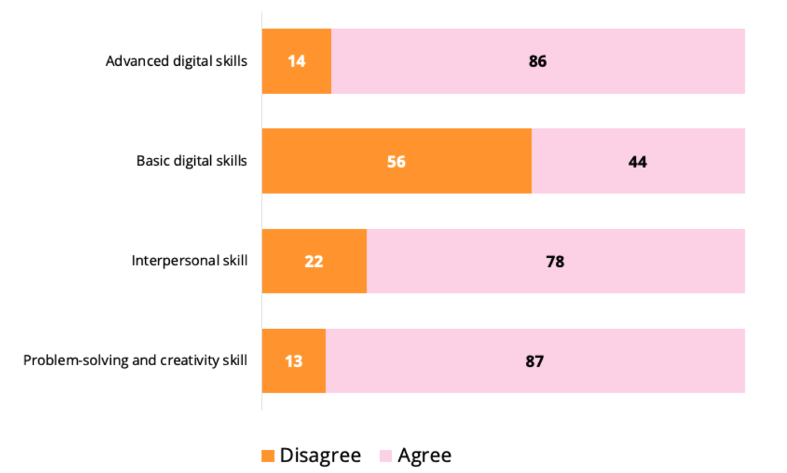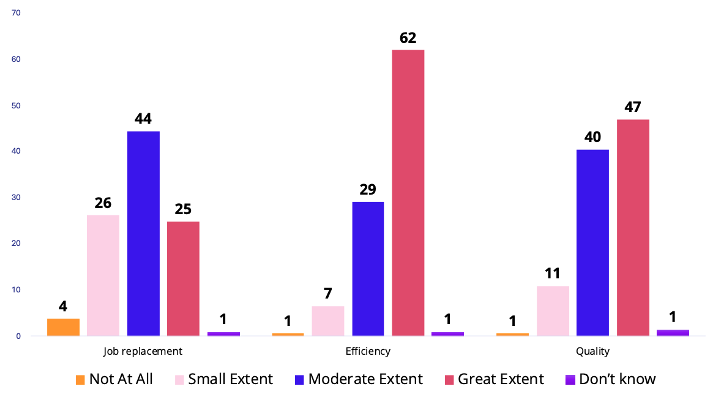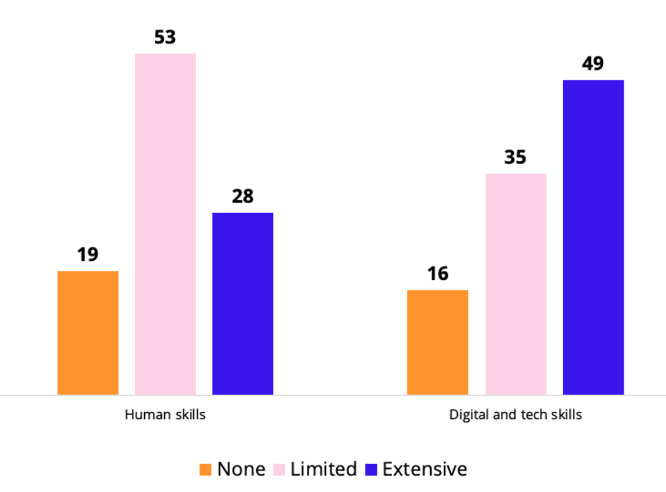Human and technology: a complementary skillset for the future
In today’s fast-changing economy, technology is advancing at speed, but the survey findings in the Industry Landscape Report make one thing clear: while digital capabilities are vital, they do not stand alone. Human skills remain equally critical. Together, they form the foundations of a workforce ready for the future.
The skills defining the digital era
We asked industry stakeholders which skills will be most valuable in the years ahead. The results reveal two dominant skill categories for the future: human-centred abilities and technical expertise.
Problem-solving and creativity were rated as critical for the future by 87% of employees, reflecting a belief that innovation and adaptive thinking are indispensable in navigation change. While 97% of managers stressed the importance of interpersonal skills when recruiting new staff, indicating that collaboration, communication and relationship-building remain fundamental to performance effectively.

Employers and employees agree that future readiness requires more than technical fluency. Businesses are not choosing between human and technical capabilities, they need both.
Where human and tech meet
Looking deeper into the findings, the survey shows that the most valuable employees are those who can blend human strengths with technical know-how. Employees do not view technology as a threat to their roles, instead, they see it as a tool that boost performance and quality, elevating their work rather than replacing it.
- Employees overwhelmingly believe that ADTs (advanced digital technologies) improve efficiency (62% to a great extent) and quality (47% to a great extent) of their work.

- 85% of employees agreed that human skills are becoming increasingly important alongside technology adoption. At the same time, managers emphasised that digital skills take precedence in hybrid environments, with 83% disagreeing that human skills matter more than digital ones in remote settings.
- 96% of employees reported enthusiasm to learn how to work with new technologies, suggesting a strong willingness to adapt as digital tools evolve.
Mind the gap: skills shortages persist
Despite recognising the importance of complementary skillsets, the survey also surfaced challenges: finding enough talent with the right mix of both human and digital skills and providing sufficient training.

- Skills gaps are widening: managers reported acute shortages in problem-solving and creativity (75%) and advanced digital skills (72%) among job candidates.
- Training investment lags behind need. While 45% of managers said their organisations provide extensive digital-skills training, only 28% report comprehensive human-skills programmes.
- Employees themselves rated basic digital skills as less of a differentiator going forward only 44% saw them as future-critical, underlining that deeper, advanced skills matter most.
From recognition to action
The future workforce must be hybrid by design, combining digital mastery with human adaptability. For businesses, this means:
- Recruitment needs to evolve: employers should look beyond narrow technical expertise and actively assess candidates for creativity, problem-solving, and collaboration.
- Learning must be integrated: training initiatives should not separate “tech skills” from “soft skills” but design programmes where the two reinforce each other.
- Leadership is pivotal
Closing the skills gap for tomorrow’s economy
The future of work is not about humans versus technology, it is about humans can work with technology and how they can complement each other. The ability to fuse technical fluency with timeless human strengths will define competitive advantage.
For organisations, the takeaway is simple but urgent: invest in both, and in the connection between them.
